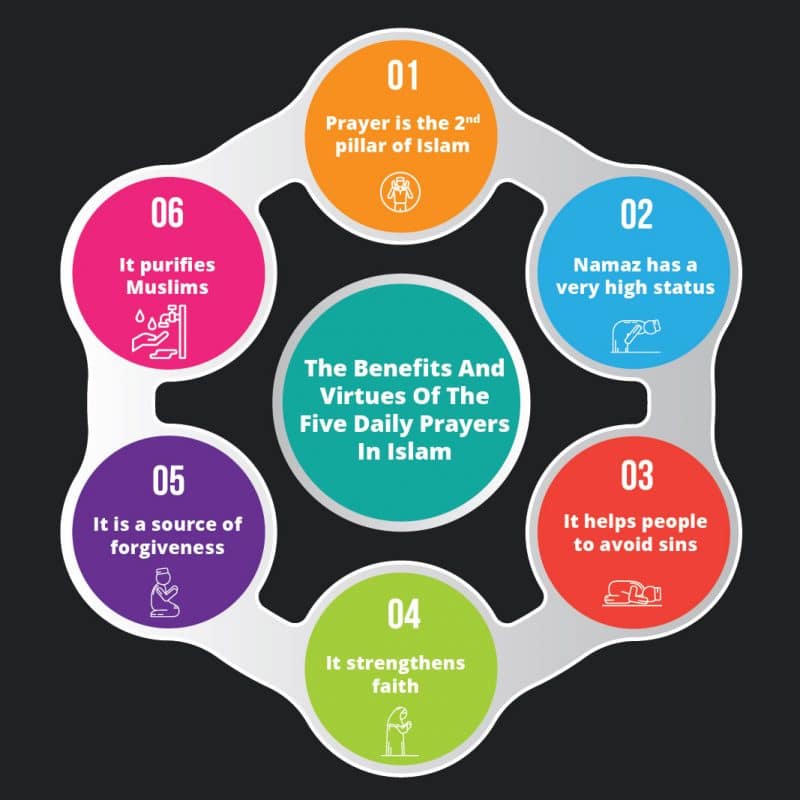Prayer is a powerful act that has been practiced by individuals and communities for centuries. It is a means of connecting with a higher power and seeking guidance, comfort, and strength. Prayer can take many forms, from silent meditation to reciting specific verses or prayers in a religious context. The act of prayer has been shown to have numerous benefits for individuals, including reducing stress, increasing feelings of gratitude and well-being, and enhancing feelings of connectedness to others and a greater sense of purpose. In this article, we will explore the power of prayer, specifically focusing on the practice of Namaz, or Islamic prayer, and the inspirational quotes that can guide and motivate us in our daily practice.
Table of Contents
Understanding Namaz: A Brief Overview
Namaz, also known as Salah, is the Islamic term for prayer. It is one of the Five Pillars of Islam, which are the basic acts of worship that are mandatory for all Muslims. The other pillars include Shahada (declaring faith in Allah), Zakat (giving to charity), Sawm (fasting during Ramadan), and Hajj (pilgrimage to Mecca).
Namaz is performed five times a day at specific times, and each prayer consists of a sequence of physical postures and recitations. These postures include standing, bowing, prostrating, and sitting. The recitations are usually done in Arabic and include verses from the Quran, as well as various supplications and praises to Allah.
Performing Namaz is considered a way of showing devotion to Allah and seeking His guidance and forgiveness. It is also believed to have numerous benefits for the individual, including developing discipline and self-control, promoting physical and mental well-being, and strengthening one’s faith.
While Namaz is a central practice in Islam, it is not limited to Muslims alone. People of all faiths can benefit from the practice of prayer, and the principles and benefits of Namaz can be applied to any form of prayer or meditation.
Namaz Quotes: Inspiration for Daily Practice
- “Verily, prayer is a great means of keeping away from evil and sins.” – Prophet Muhammad (peace be upon him)
- “Prayer is the key to paradise.” – Prophet Muhammad (peace be upon him)
- “The first act that the servant of Allah will be accountable for on the Day of Judgment will be prayer.” – Prophet Muhammad (peace be upon him)
- “Verily, I have only been commanded to worship Allah and to perform prayer.” – Quran 51:56
- “And establish prayer. Indeed, prayer prohibits immorality and wrongdoing.” – Quran 29:45
- “The difference between a believer and a disbeliever is prayer.” – Prophet Muhammad (peace be upon him)
- “The most beloved deeds to Allah are the consistent ones, even if they are small.” – Prophet Muhammad (peace be upon him)
- “The prayer of a person in congregation is 27 times superior to his prayer alone.” – Prophet Muhammad (peace be upon him)
- “Prayer is a shield to the soul.” – Imam Ali (may Allah be pleased with him)
- “The best among you are those who have the best manners and character.” – Prophet Muhammad (peace be upon him)
- “When you stand up for prayer, pray as if it is your last prayer.” – Prophet Muhammad (peace be upon him)
- “The coolness of my eyes lies in prayer.” – Prophet Muhammad (peace be upon him)
- “Prayer is a pillar of religion, and whoever establishes it, establishes religion.” – Imam Ali (may Allah be pleased with him)
- “Prayer is the ascension of the believer.” – Prophet Muhammad (peace be upon him)
- “The prayer of the night is one of the most excellent acts of devotion.” – Prophet Muhammad (peace be upon him)
- “Allah does not look at your appearance or your possessions, but He looks at your heart and your deeds.” – Prophet Muhammad (peace be upon him)
- “Make sure your heart is present in your prayer, and your mind is focused on Allah.” – Imam Ali (may Allah be pleased with him)
- “The most beloved prayer to Allah is the one that is performed on time.” – Prophet Muhammad (peace be upon him)
- “Prayer is a conversation with Allah, so speak with Him from your heart.” – Imam Ali (may Allah be pleased with him)
- “Prayer is a source of strength and guidance for the believer.” – Imam Hassan (may Allah be pleased with him)
The Benefits of Regular Prayer
Regular prayer can have numerous benefits for individuals, both in terms of their physical and mental well-being, as well as their spiritual development. Some of the key benefits of regular prayer include:
- Reducing stress and anxiety: Prayer can help to calm the mind and reduce feelings of stress and anxiety. The act of focusing on prayer and connecting with a higher power can help individuals to feel a sense of peace and tranquility.
- Improving mental health: Regular prayer has been shown to have a positive impact on mental health, including reducing symptoms of depression and anxiety, and improving overall psychological well-being.
- Promoting physical health: The physical postures and movements involved in prayer can help to improve flexibility, strength, and balance. Regular prayer has also been shown to have a positive impact on cardiovascular health, including lowering blood pressure and reducing the risk of heart disease.
- Developing discipline and self-control: The practice of regular prayer requires discipline and self-control, which can help individuals to develop these qualities in other areas of their lives as well.
- Strengthening faith: Regular prayer can help individuals to deepen their faith and develop a stronger connection with a higher power. It can also provide a sense of purpose and meaning in life.
- Enhancing feelings of gratitude and well-being: Prayer can help individuals to cultivate feelings of gratitude and contentment, and develop a greater sense of appreciation for the blessings in their lives.
Overall, regular prayer can have a powerful and positive impact on individuals, helping them to develop a greater sense of inner peace, strength, and connection with a higher power.
Overcoming Obstacles in Prayer
Prayer is an important spiritual practice that can provide individuals with a sense of peace and connection with a higher power. However, there are many obstacles that can prevent individuals from fully engaging in prayer. Here are some tips for overcoming these obstacles:
- Lack of focus: It can be challenging to focus during prayer, especially if the mind is distracted by other thoughts and concerns. One way to overcome this obstacle is to set aside a specific time and place for prayer, and to eliminate distractions as much as possible. Focusing on the meaning and purpose of the prayers can also help to maintain concentration.
- Lack of motivation: Sometimes, individuals may feel demotivated or uninspired to engage in prayer. One way to overcome this obstacle is to remind oneself of the benefits of prayer, such as the sense of inner peace and connection with a higher power that it can provide. Setting specific goals and intentions for one’s prayer practice can also help to increase motivation.
- Doubts and skepticism: It is common for individuals to experience doubts or skepticism about the efficacy of prayer, especially if they do not see immediate results. One way to overcome this obstacle is to reflect on the experiences of others who have found prayer to be a powerful and transformative practice. Seeking guidance and support from a spiritual teacher or community can also be helpful in addressing doubts and questions.
- Physical limitations: Physical limitations, such as illness or injury, can make it challenging to engage in certain postures or movements during prayer. One way to overcome this obstacle is to modify the practice to accommodate one’s physical limitations. For example, individuals with mobility issues can perform prayer while seated or lying down.
- Time constraints: Busy schedules and competing priorities can make it difficult to find time for prayer. One way to overcome this obstacle is to make prayer a priority and to schedule it into one’s daily routine. Finding creative ways to integrate prayer into daily activities, such as reciting prayers during a commute or while doing household chores, can also be helpful.
Overall, overcoming obstacles in prayer requires patience, persistence, and a commitment to one’s spiritual practice. By being mindful of these obstacles and taking steps to address them, individuals can deepen their connection with a higher power and experience the many benefits of regular prayer.
Prayer as a Source of Inner Peace and Strength
Prayer can be a powerful source of inner peace and strength for individuals, especially during times of difficulty and uncertainty. Here are some ways in which prayer can help individuals cultivate inner peace and strength:
- Connecting with a higher power: Prayer provides individuals with an opportunity to connect with a higher power, which can provide comfort, guidance, and support during challenging times. This connection can help individuals to feel less alone and more supported, which can in turn promote a sense of inner peace.
- Letting go of worries and concerns: Prayer can help individuals to let go of worries and concerns, and to place their trust in a higher power. By surrendering their fears and anxieties to a higher power, individuals can experience a sense of relief and inner peace.
- Cultivating gratitude: Prayer can help individuals to cultivate feelings of gratitude and contentment, by focusing on the blessings in their lives and expressing appreciation for them. This can help to promote a sense of inner peace and contentment, even during challenging times.
- Developing resilience: Regular prayer can help individuals to develop resilience, by providing them with a sense of inner strength and purpose. By turning to prayer during times of difficulty, individuals can develop a sense of inner resilience that can help them to overcome challenges and adversity.
- Fostering compassion and kindness: Prayer can help individuals to cultivate feelings of compassion and kindness towards themselves and others. By connecting with a higher power and seeking to do good in the world, individuals can experience a sense of inner peace and fulfillment.
Overall, prayer can be a powerful tool for cultivating inner peace and strength. By making prayer a regular part of their spiritual practice, individuals can deepen their connection with a higher power and experience the many benefits of a more peaceful and resilient mindset.
Prayer in the Modern World: Maintaining a Connection with the Divine
In the modern world, it can be challenging to maintain a connection with the divine through prayer, especially with the distractions and demands of daily life. Here are some tips for maintaining a connection with the divine through prayer in the modern world:
- Make prayer a priority: One of the most important ways to maintain a connection with the divine through prayer is to make it a priority in one’s daily routine. This may mean setting aside specific times of the day for prayer, or integrating prayer into daily activities such as commuting, exercise, or household chores.
- Use technology mindfully: Technology can be a double-edged sword when it comes to prayer. On one hand, it can provide access to a wealth of resources such as prayer apps, online communities, and virtual spiritual guidance. On the other hand, it can also be a source of distraction and disconnection. It’s important to use technology mindfully, and to seek out resources that support one’s spiritual practice.
- Seek out spiritual community: Connection with a spiritual community can be a powerful way to maintain a connection with the divine through prayer. This may involve attending religious services, joining a spiritual group or community, or seeking out online communities that support one’s spiritual practice.
- Be adaptable: It’s important to be adaptable when it comes to prayer in the modern world. This may mean finding new ways to pray when traditional methods are not feasible, or being open to different spiritual practices that resonate with one’s beliefs and values.
- Practice gratitude: Cultivating feelings of gratitude and appreciation can be a powerful way to maintain a connection with the divine through prayer. By focusing on the blessings in one’s life, and expressing appreciation for them through prayer, individuals can deepen their connection with a higher power and experience a greater sense of peace and contentment.
Overall, maintaining a connection with the divine through prayer in the modern world requires mindfulness, adaptability, and a commitment to one’s spiritual practice. By making prayer a priority, seeking out spiritual community, and practicing gratitude, individuals can cultivate a deeper connection with the divine and experience the many benefits of a more spiritual life.
Conclusion: Embracing the Power of Prayer in Our Lives
In conclusion, prayer is a powerful tool for cultivating inner peace, strength, and connection with a higher power. By making prayer a regular part of our spiritual practice, we can experience a deeper sense of meaning, purpose, and fulfillment in our lives.
While prayer can sometimes feel challenging or intimidating, especially in the modern world, there are many resources and strategies available to help us maintain a connection with the divine. By making prayer a priority, seeking out spiritual community, and practicing gratitude, we can deepen our connection with a higher power and experience the many benefits of a more spiritual life.
Ultimately, embracing the power of prayer requires a willingness to let go of our fears and concerns, and to place our trust in a higher power. By doing so, we can experience a sense of inner peace and resilience that can help us to overcome challenges and adversity, and to live a more meaningful and fulfilling life.
So let us embrace the power of prayer in our lives, and allow it to guide us on our spiritual journey towards greater peace, love, and understanding.





